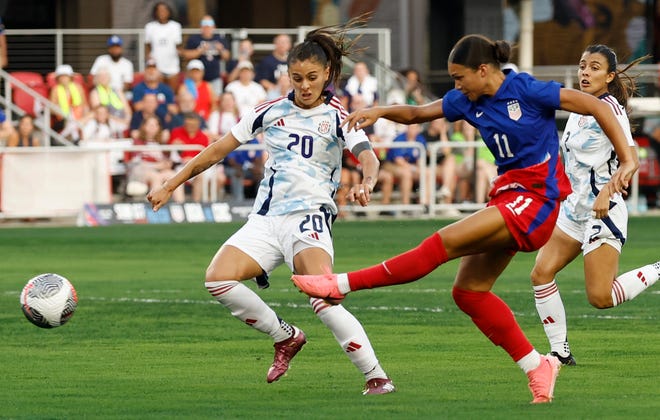WASHINGTON — The next time the U.S. women's national soccer team takes to the pitch in earnest will be at the 2024 Paris Olympics.
There will be no more friendlies like the four that kicked off the Emma Hayes era for the U.S. women's national team, the last of which was a scoreless draw against Costa Rica on Tuesday in their final warm-up before the Paris tournament.
The U.S. had the upper hand in possession of the ball but couldn't score a goal as the 96-degree weather at kickoff made it difficult for the players and the 18,972 fans at Audi Field to cope, and before kickoff the team announced that Rose Lavelle would sit out due to a groin strain.
Here are three lessons learned from this match:
Continued problems finding the back of the net
Their finishing weaknesses continued in the capital, with attacks too often played out as if the only way they could score was through a backdoor cross, which never panned out.
The U.S. dominated and controlled the ball for 80% of the game. They outshot Costa Rica 26 to 2. Costa Rican goalkeeper Noelia Bermudez looked like the star of the game, saving all 12 shots on the U.S. goal.
“If you play a percentage and law of averages game, we're creating more and more quality chances, getting more guys in key areas, getting more touches in key areas,” Hayes said after the game.
Coming off a 1-0 win over Mexico on Saturday, Hayes was hoping for more composure in attack and better finishing against Costa Rica, currently ranked 44th in the world and out of the Olympic qualification pool.
Costa Rica forced its way into the box, making it difficult for the U.S. to find shooting lanes or space to challenge, marking the first time in 18 tries that Costa Rica has not lost to the U.S.
“I have all the confidence in my team. We wanted to create better chances, better opportunities, more shots, more quality chances,” captain Lindsey Horan said. “I think that carried over from (the Mexico game) to this game. Costa Rica made it hard for us.”
“I want to do this now rather than the Olympics.”
Horan said the offensive decision-making in those crucial moments could be improved. Trinity Rodman, who nearly scored with a rocket-like shot in the final minute of added time, said the U.S. did everything it could to push Costa Rica out of a packed field. Costa Rica stayed put.
“For us, it was a challenge,” Rodman said.
Hayes said the team has played four friendlies and trained six times since she took over as head coach of the U.S. women's national team. With limited time to work with new players and settle in, she's confident the goals will come eventually.
“We definitely need to be more clinical,” Hayes said. “I don't want to take it for granted, but we've had about six training sessions in total since I took over as coach and I think the results have been pretty good so far.”

This team can't do without Rose LaBelle.
Winning a medal in Paris will be plenty of challenge for the new U.S. Women's National Soccer Team.
Going into the match without Rose Lavelle, or the weakened form of their dynamic midfielder, will be even more difficult. Lavelle was left out of the squad after the warm-up, a move made out of an abundance of caution on a sweltering, uncomfortable evening on a subpar court due to a recent rugby match at the Audi Field.
“There's no risk,” Hayes said.
Lavelle's finishing ability and ability to pass to teammates were absent, and in his place was the team's second-youngest player, Corbin Albert, one of the next generation of players Hayes has chosen to give international experience at this tournament.
Ravel took part in the post-match sending-off ceremony and moved around the press box without a hitch, but if for some reason he isn't fully fit for France, one of the younger players will have to do more than take part.
About Team USA: See all athletes selected to the U.S. Olympic Team
Olympic Newsletter: Subscribe now for coverage of your favorite athletes at the Paris 2024 Olympics
Playing in sweltering heat in France can only be an advantage
Hayes said Monday that Tuesday's forecast of a heat index above 100 in Washington, D.C., was “perfect setup for Marseilles.”
“It's pretty hot up there, so it's a great opportunity to get some experience of what you're going to be facing,” Hayes said. “To me, that's the added value.”
The team continued practicing on Monday in shaded areas of the field (at least in the areas where reporters were allowed to watch) as temperatures neared 100 degrees. Tuesday night's game included hydration breaks between halves.
The heat was something the players had never experienced before, and Saturday's game against Mexico in New Jersey was another hot one, with the sun beating down on them.
The U.S. will face Zambia in Nice, France, nine days later, before competing in group matches against Germany on July 28 and Australia on July 31, both of which will be played in Marseille.
“It looks like it's going to be even hotter (in Marseille),” Casey Kruger said, “so if we can play in these conditions, we should have some confidence going into the France game. Our last two games have been amazing.”
With the game still a long way to go, the weather forecast for the next two weeks is unpredictable, predicting a high of 88 degrees Fahrenheit for the Germany game. However, kick-off isn't until 9pm local time, so temperatures should cool by then.
Veterans like Crystal Dunn and Horan are used to the heat in France during international tournaments, as the country experienced a heatwave during the 2019 World Cup that the United States won.

